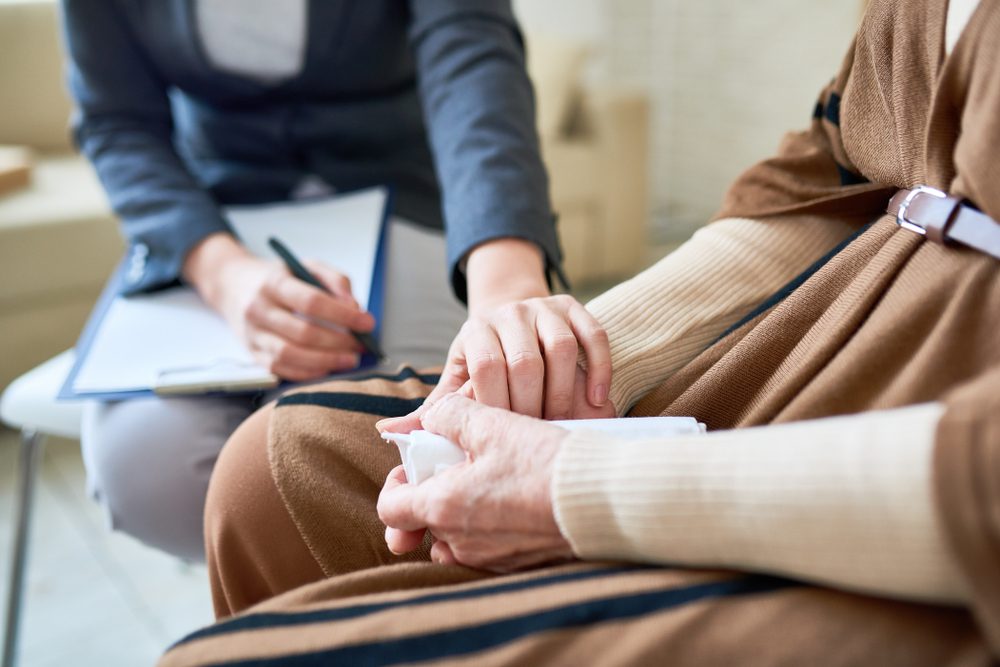Let’s go through the grieving process together!
Losing someone you love will never be an easy situation. Some may feel the need to cry, while some may just feel empty. Others can even experience anger. When someone passes away, it’s difficult to come to terms with what has happened.
While going through the grieving process, you’ll probably go through many emotions in the days ahead of you, and it’s normal not to know what to do. At times, you might even feel like your world is simply crumbling around you. But you never have to give up hope.
We understand that it’s hard to stay positive when you’re feeling such profound grief because of the passing of a person you loved. Yet, it’s also possible for you to find strength and hope by taking a few certain steps.
Take a look at the following 7 tips that can make the grieving process easier for you.

Tip #1: Allow Yourself To Go Through The Grieving Process
First and foremost, don’t try to run away and hide from your grief. You must experience the pain and sorrow to be able to move past it and begin the healing process.
Accepting that a loved one is gone isn’t a walk in the park, and some people try to avoid grieving instead of processing it. Your first thought might be to throw yourself into your work to avoid having to think about your lost loved one.
This isn’t healthy, and it will greatly benefit you if you let yourself get emotional about the heartache you’re going through. Coping with grief will take time, and you don’t need to go through the grieving process alone. Finding someone you can talk to could help.
Also, you might just need to spend some time feeling emotional and sad. It’s normal to be feeling this way when something like this has happened, and crying is never a sign of weakness.
We understand that everyone is different, and coping with loss might not come naturally to you. You just need to give yourself time.
Tip #2: Remember Your Loved One
Yes, this is allowed when going through the grieving process! Thinking about your loved one can help you to feel a lot better sometimes. Occasionally, it can feel like remembering the person you lost will make you sadder than you already are.
Nevertheless, you’ll ultimately be able to look back on the times you spent together, and you’ll smile. It’s great to spend a little time thinking about the moments you cherished with the person you lost.
You can watch videos, look at pictures, and just reminisce on the times you spent together. You can make this a periodic activity that will help you reflect on the positive side of your relationship with that person.
If it’s too hard to remember the good times, you might find that you need to wait a bit longer and give yourself some more time to process.
Tip #3: Focus On Positive Activities
Getting involved in some type of activity you enjoy keeps you focused and offers a welcome distraction from your grieving process. If that movement happens to be especially helpful to others, you might discover it can also raise your spirits.
If you’ve started to feel a tad better after going through the grieving process, then it’s probably a good time to get back to doing the positive things you love. For lots of people, it’s best to focus on cheerful activities that will help them enjoy life again.
You might want to spend some time partaking in some of your favorite pastimes so you can start being cheerful more often. It would also be great to spend some time doing positive things that benefit your physical health, like exercising and eating better.
These small actions can make coping with loss much easier, and they can get you closer to feeling like your old self again.

Tip #4: Speak To A Doctor
Talking to a doctor when going through the grieving process is actually a good idea if you find yourself having more severe issues. You may or may not have considered depression developing due to your grief.
If you’re concerned, speak to your healthcare professional as soon as you can. Your doctor will be able to monitor your particular situation and can help you out in varied ways. But, even if you don’t think you’re depressed, speaking to your doctor can help you find ways to cope.
If you’re looking for an ideal way to remember the person you’ve lost, you could consider supporting some sort of research in their name.
Tip #5: Therapy Can Always Help
Speaking to a professional is very beneficial when you’re having a rough time going through the grieving process. You may feel the need to work with a professional in order to process everything that’s happened in your life.
Complex feelings can spring up unexpectedly because of the loss of a special someone, and you should have an ally that you can turn to during your rough times. A therapist can be an ally who’ll be able to help you cope with death and losing someone.
It’ll obviously take time to get over the passing of someone that was close to you. But it’s important we remind you that you don’t have to face things alone.
Counselors have been helping people deal with the grieving process for ages, and you can work with one if you’re ready to move forward with your life. Some people like the traditional in-person therapy options, and others will opt for online therapy.
Online therapy is an ideal option for people who want therapy but without having to leave their homes. This type of therapy is convenient, and it’s also pretty affordable. Whichever way you go, it’ll be comforting to know that you don’t have to deal with things alone.
Tip #6: Religion Can Help Too
If you’ve already tried therapy, and a support group doesn’t seem like a good fit for you and your grieving process, then you might want to consider seeking some religious guidance.
If you’re religious, you can find some peace in your religion when dealing with the death of a close friend or relative. It can bring you comfort to know that your loved one is in a better place.
And if you ever have any questions about the topic, turning to a religious leader in your community can turn out to be very beneficial. They can give you guidance so you can start coping with your grief in a healthy way.
Choosing this coping method while in the grieving process is a source of strength for religious people. If you aren’t religious, though, then it’s absolutely necessary to lean on your support system when you need it the most.

Tip #7: What Would Your Loved One Want For You?
This last tip on the grieving process is an important one to help you put things a bit more into perspective. It can be very beneficial to take the time to think about what your loved one would wish for you.
Would this person want you to keep feeling unhappy or angry forever since they’re not around anymore? Or would they want you to live a full and happy life, fulfilling your hopes and dreams?
We’re sure that the person you lost cared for you deeply, and they would want you to find peace again. Sure, it takes time, and it’s perfectly acceptable to feel the way you do.
Just be aware that your loved one would want to be a source of happiness for you, not a well of sadness. Ultimately, we believe you’ll find the strength to move forward again, and you’ll always remember the person you’ve lost.
We hope our tips on the grieving process have been helpful to you. One last thought, though: To help you along the way, why not get everything out on paper? A journal is a terrific tool that will allow you to express yourself without any added judgment.
You can let all your feelings out on paper, whether it be anger, sadness, or regret. Occasionally, even with the best support systems out there, it’s still hard to express how you feel. Finding a safe and personal way to do so will help in processing everything.
If you found this article beneficial, we also recommend reading: 11 Signs of Depression in Seniors and What You Can Do About It














